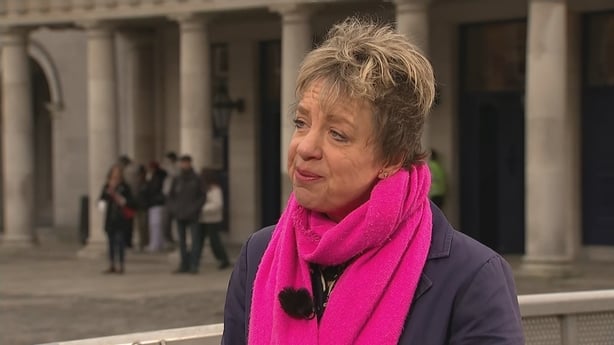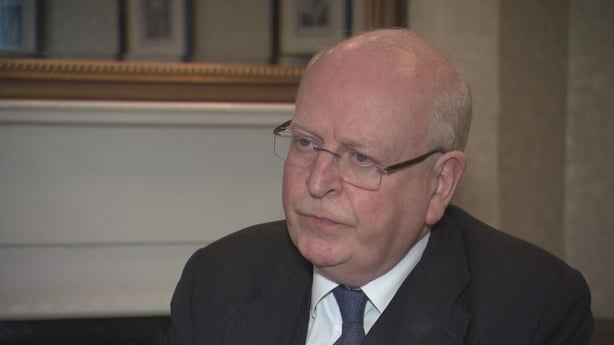The Minister for Justice has confirmed she is not moving ahead with plans to introduce new hate speech laws, but she will press ahead with the hate crime element of criminal justice legislation.
Speaking in Athlone, Helen McEntee confirmed that she will introduce committee stage amendments to the Criminal Justice (Incitement to Violence or Hatred and Hate Offences) Bill 2022 in the Seanad.
"The incitement to hatred element [of the bill] does not have a consensus, so that will be dealt with at a later stage," Ms McEntee said.
Ms McEntee said she brought her proposed changes to this bill to the leaders of the three coalition parties over the summer.
"I am adamant that hate crime legislation will be enacted," she said.
"This will send a very pure message, if you attack a person, if you commit a crime against a person or a group of people, simply because of who they are, the color of their skin, where they have come from that there will be a tougher sentence, a harsher sentence at the end of the day," Ms McEntee said.
Minister for Public Expenditure and Reform Paschal Donohoe said the Government had accepted that with regard to some parts of the Bill it had "not been able to generate the consensus and agreement that is needed is such an important piece of legislation."
Existing hate speech legislation dates back to 1989, but Mr Donohoe said the Government initiatives in other areas also address the issue of hate speech.
"The Government... has always made very clear our views regarding the distress that some particular forms of language can cause," Mr Donohoe said, also speaking in Athlone.
"What we are doing is through other forms of legislation, for example our efforts to look at what is happening in social media, our efforts to regulate that better, are a clear sign of our effort to deal with the effect that language and incitement can have on behaviour and threats within our society," Mr Donohoe said.
The Bill passed the final stage of the Dail in April 2023 with 110 TDs voting in favour and 14 against.
Some of those who voted in favour of the Bill, including Sinn Féin TDs and some Government backbenchers, subsequently criticised the Bill.
It stalled in the Seanad after passing the second stage.

Labour Leader Ivana Bacik criticised the decision to drop the "incitement to hatred" provisions in the bill and called it "a Government failing".
"It is I think deeply regrettable to those of ethnic minorities, to those in the LGBTQ community, to people we have seen targeted with hate speech and incitement to hatred in recent months and years, who will feel, I think, less protected than they would have done had this Bill had been able to progress as it should have done," Ms Bacik said, speaking on RTÉ's Saturday with Colm Ó Mongáin.
Ms Bacik said that the Government was "apparently bowing to some sort of pressure to do this."
Current provisions in the Prohibition of Incitement To Hatred Act, 1989 "need to be replaced", she added.
The Labour leader quoted Minister McEntee in 2023 describing that legislation as "ineffective, limited and largely discredited."
"That's because it's almost impossible to bring a successful prosecution for incitement to hatred under the current law, that's why its necessary that we change the law," Ms Bacik said.
"Concerns were identified as the Bill was proceeding through the Oireachtas, the Government has had a whole summer recess in which to address those concerns and bring forward any necessary amendments so that the Bill will achieve consensus before, whenever the election is," Ms Bacik added.

Senator Michael McDowell has welcomed the changes being made to the bill.
"I very much welcome that opposition in the Seanad has caused the Government to rethink the matter and Government backbenchers to put pressure on the Government to see sense on this matter," he said.
The former minister for justice said the loose language contained in part of the bill was an affront to nearly every constitutional principle.
"I asked the Minister for Justice, Helen McEntee, why she wouldn't have defined the term hatred and she said two attorney generals has told her it would make it more difficult to prosecute, but if you look right across the world people are being prosecuted on very flimsy words... we can't have language which restricts people's freedom of expression and leaves it to judges to decide it in the end."
The Senator added that the Irish Government ignored a UN conference that stated criminalising hate speech required a high bar as to what is and is not hatred.
"The Irish Government decided to ignore that and come up with an undefined concept of hatred," he said.
He said its been shown that people have lost their jobs, had to move house and endure substantial interference in their own lives for simply exercising their right to state what their opinions are, which other people find offensive.
We need your consent to load this rte-player contentWe use rte-player to manage extra content that can set cookies on your device and collect data about your activity. Please review their details and accept them to load the content.Manage Preferences
"The reality is that the right to free speech also entails the right to offend and as long as its not calculated to cause violence or cause a riot then we have to put up with it. I've had to put with it as a politician.
"We have to face up to the fact that free speech means things which some people may not like," he added.
Issues with controversial bill
The debate over the bill had been controversial.
Issues with its lack of definition of what constituted hate speech, the extended range of categories to which hatred or offence could be caused, and perceived dangers to free speech led to much questioning and criticism.
Earlier this year, Sinn Féin was among those to call for the bill to be scrapped.
In a statement in March, its spokesperson on Justice Pa Daly said the party "raised a number of serious concerns about flaws" in the bill.
Sinn Féin was criticised as it had previously supported the legislation.
The party's TDs voted in favour of the bill in the Dáil last year.
Finance Spokesperson Pearse Doherty said the party had not supported the bill in the Seanad and had voted against it in the upper house last June.
"We had raised serious concerns with this legislation right through the process and had tabled a number of amendments," he said.
"The Government in its arrogance refused to listen, not only to Sinn Féin's amendment but also to the other amendments that were coming from the opposition."
Mr Doherty said it was time to stop the "farce" of the bill as he said too much time had been spent on the proposed legislation, which did not have cross party support.
Tech billionaire Elon Musk previously said he would fund legal challenges to the legislation.
Additional reporting Joe Mag Raollaigh







